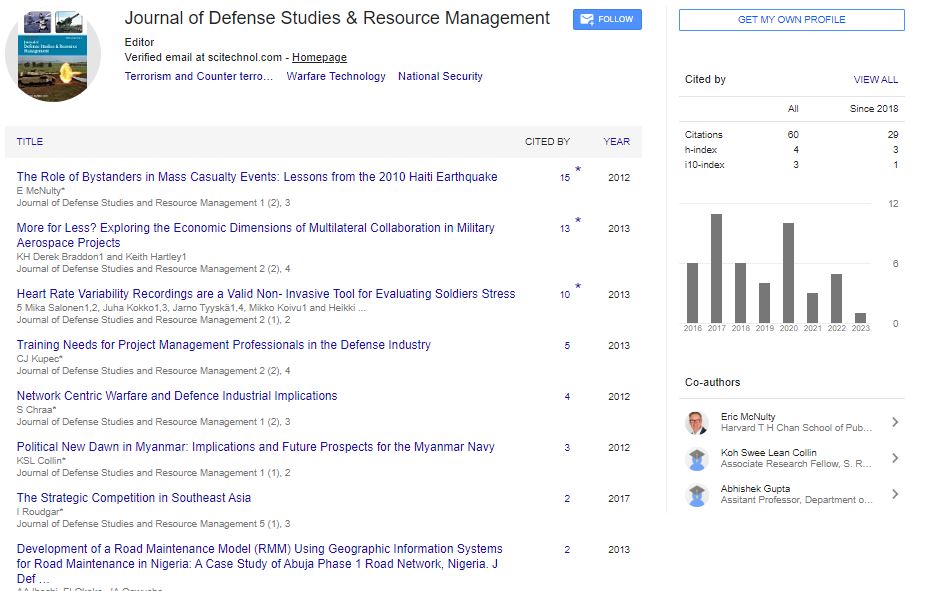Opinion Article, J Def Stud Resour Manage Vol: 11 Issue: 1
Ensuring Cybersecurity in Military Operations
Danialsson Aura*
1Department of War Studies and Military History, Swedish Defence University, Stockholm, Sweden
*Corresponding Author: Danialsson Aura
Department of War Studies and
Military History, Swedish Defence University, Stockholm, Sweden
E-mail: a.danielsson@fh.se
Received date: 28 February, 2023, Manuscript No. JDSRM-23-95539;
Editor assigned date: 03 March, 2023, Pre QC No. JDSRM-23-95539(PQ);
Reviewed date: 17 March, 2023, QC No. JDSRM-23-95539;
Revised date: 24 March, 2023, Manuscript No. JDSRM-23-95539(R);
Published date: 31 March, 2023, DOI: 10.4172/2324-9315.1000169
Citation: Aura D (2023) Ensuring Cybersecurity in Military Operations. J Def Stud Resour Manage 11:1.
Description
Cybersecurity is an important aspect of military operations, as the use of information technology has become increasingly essential for military operations. Cyberattacks can compromise military systems, interrupt communication and data transfer, and can even compromise military mission success. Therefore, ensuring cybersecurity is essential to maintaining a successful military operation.
One of the most important ways to ensure cybersecurity in military operations is through training and awareness. Military personnel must be trained to recognize potential cyber threats and how to respond to them. This includes identifying suspicious emails, links, and attachments and knowing how to report them. Personnel must also be trained to recognize social engineering tactics, which are often used by attackers to gain access to sensitive information.
Another important aspect of ensuring cybersecurity in military operations is to implement strong access controls. Access controls refer to the mechanisms in place that limit who can access specific systems, data, and information. By limiting access to only authorized personnel, the risk of unauthorized access and data breaches can be significantly reduced. Strong access controls can include multifactor authentication, password policies, and role-based access controls.
Encryption is another important tool for ensuring cybersecurity in military operations. Encryption is the process of converting plaintext data into a coded format, making it unreadable to anyone who does not have the encryption key. This can help protect sensitive information, such as mission plans, communications, and intelligence data. Military operations should ensure that encryption is used for all sensitive information transmitted over the internet or stored on digital devices.
Patch management is also essential to ensuring cybersecurity in military operations. A patch is a software update that addresses a known vulnerability or bug. Failure to update systems with the latest patches can leave them vulnerable to cyber-attacks. It is essential to maintain a regular patch management program to ensure that all systems and devices are updated with the latest patches.
Network segmentation is another important aspect of ensuring cybersecurity in military operations. Network segmentation refers to dividing a network into smaller, isolated segments, which can reduce the spread of a cyber-attack if one segment is compromised. Segmentation can also help to limit the impact of an attack, as attackers will have limited access to only the segment they have compromised.
Regular testing and auditing of systems and networks is another essential aspect of ensuring cybersecurity in military operations. Regular testing can help identify vulnerabilities and weaknesses in systems and networks, allowing them to be addressed before a cyberattack occurs. Auditing can also help to identify areas of improvement in cybersecurity processes and procedures.
Finally, it is essential to have a comprehensive incident response plan in place to ensure that if a cyber-attack does occur, it is quickly identified and contained. The incident response plan should include procedures for reporting the incident, identifying the affected systems and networks, and mitigating the impact of the attack. It should also include procedures for recovering from the attack and restoring systems to their previous state.
In conclusion, ensuring cybersecurity in military operations is essential to maintaining mission success and protecting sensitive information. This can be achieved through training and awareness, implementing strong access controls, using encryption, maintaining a regular patch management program, network segmentation, regular testing and auditing, and having a comprehensive incident response plan in place. By implementing these measures, military operations can minimize the risk of cyber-attacks and ensure that their systems and networks remain secure.
 Spanish
Spanish  Chinese
Chinese  Russian
Russian  German
German  French
French  Japanese
Japanese  Portuguese
Portuguese  Hindi
Hindi 